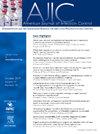评估 COVID-19 传播风险:住院行为健康机构中的室友和单位配偶接触。
IF 3.8
3区 医学
Q2 INFECTIOUS DISEASES
引用次数: 0
摘要
背景:精神科住院患者的感染传播风险固然会增加。本研究旨在评估室友和单位伙伴暴露对 COVID-19 传播的影响,为最安全的隔离措施提供参考:2020年7月至2023年8月期间,我们在一家住院行为健康医院的六个病房对住院患者进行了一项单中心回顾性研究。我们比较了患者接触具有传染性的室友与接触具有传染性的单位同事后感染 COVID-19 的风险:在研究期间,总体转换率为 10.05%,室友转换率为 24.4%,单位同事转换率为 9.3%;接触室友的患者在接触后感染 COVID-19 的几率是室友的 3.14 倍(95% 置信区间,1.42-6.92)。根据单位分层分析,与单位室友暴露的患者相比,老年精神科单位室友暴露的患者暴露后转化的风险最高(几率比 6.38,95% 置信区间 1.75-23.22)。逻辑回归分析发现,与集体治疗时间增加相关的风险并不显著:结论:在接受精神科住院治疗的患者中,接触 COVID-19 传染性室友会显著增加感染 COVID-19 的风险。将具有传染性和暴露于COVID-19的患者分组并避免多床位病房可成功降低精神病护理期间的COVID-19传播风险。本文章由计算机程序翻译,如有差异,请以英文原文为准。
Assessing COVID-19 transmission risk: Roommate and unit mate exposures at an inpatient behavioral health facility
Background
Inpatient psychiatric facilities have an increased risk of infection transmission. This study evaluated the impact of roommate and unit mate exposures on coronavirus disease-2019 (COVID-19) transmission to inform isolation practices.
Methods
A single-center retrospective study was conducted among patients hospitalized in an inpatient behavioral health hospital from July 2020 through August 2023. We compared the risk of COVID-19 acquisition after exposure among patients with a contagious roommate versus those exposed to a contagious unit mate.
Results
During the study period, the conversion rate was 10.05% overall, 24.4% for roommates, and 9.3% for unit mates; patients exposed to a roommate were at 3.14 times higher odds (95% confidence interval, 1.42-6.92) of acquiring COVID-19 after exposure. On unit-stratified analysis, patients exposed to a roommate on the geropsychiatric unit had the highest risk of postexposure conversion compared with unit mate exposed patients (odds ratio 6.38, 95% confidence interval 1.75-23.22). Logistic regression analysis identified a nonsignificant risk associated with increased time in group therapy.
Conclusions
Exposure to a COVID-19-contagious roommate significantly increases the risk of COVID-19 acquisition among exposed patients receiving inpatient psychiatric care. Cohorting contagious and exposed individuals and avoiding multibedded rooms may mitigate COVID-19 transmission risk during psychiatric care.
求助全文
通过发布文献求助,成功后即可免费获取论文全文。
去求助
来源期刊
CiteScore
7.40
自引率
4.10%
发文量
479
审稿时长
24 days
期刊介绍:
AJIC covers key topics and issues in infection control and epidemiology. Infection control professionals, including physicians, nurses, and epidemiologists, rely on AJIC for peer-reviewed articles covering clinical topics as well as original research. As the official publication of the Association for Professionals in Infection Control and Epidemiology (APIC)

 求助内容:
求助内容: 应助结果提醒方式:
应助结果提醒方式:


